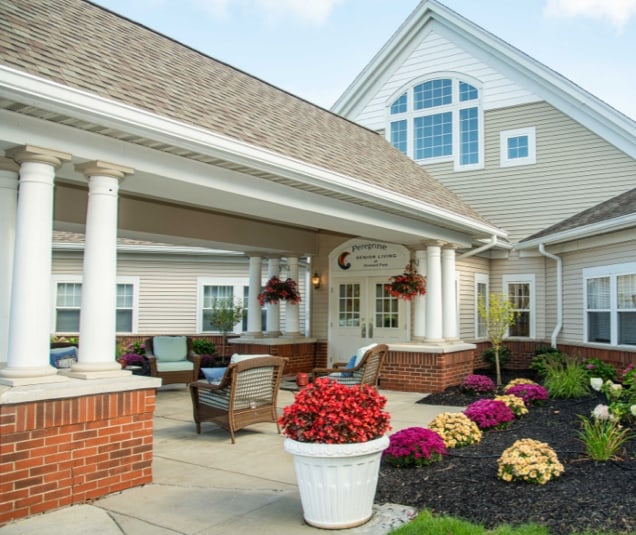Dementia refers to a group of conditions that cause memory loss, difficulty thinking, and changes in behavior and personality. Caring for someone with dementia can be challenging and overwhelming at times. It requires patience, understanding, and support from others.
If you’re caring for a loved one with dementia, it’s important that you seek help when and if needed. Here are some ways for you to get the help you may need:
- Educate yourself about dementia
- Join a support group
- Seek professional help
- Take breaks and practice self-care
- Consider memory care
Educate Yourself About Dementia
The more you know about dementia, the better equipped you’ll be to care for a loved one with the condition. There are many resources available, such as books, online articles, and educational programs, that can help you understand what dementia is and how it affects those living with it. Learning about the different types of dementia and their symptoms can also help you better anticipate and address your loved one’s needs.
Join a Support Group
Caring for someone with dementia can feel isolating at times. It can be helpful to connect with others who are going through similar experiences. Joining a support group for caregivers of individuals with dementia can provide emotional support, practical advice, and a sense of community. You may also learn new coping strategies and helpful tips from others in the group.
Seek Professional Help
Caring for someone with dementia often requires specialized care, especially as the condition progresses. It’s important to seek professional help and guidance from doctors, psychologists, or other healthcare professionals who specialize in dementia care. These experts can provide valuable insights, tools, and resources to help you better manage your loved one’s condition.
Take Breaks & Practice Self-Care
Caring for someone with dementia can be physically and emotionally draining. It’s crucial to take breaks and practice self-care to avoid burnout. This could mean, for instance, asking family members or friends to help out with caregiving duties so that you can also have some time for yourself. It’s also important to prioritize your physical and mental well-being by taking breaks, exercising regularly, and seeking support from others.
Consider Memory Care Communities

As dementia progresses, the level of care that your loved one needs may increase to the point where it becomes difficult for a family member to provide adequate care in the home. In such cases, it may be worth considering transitioning to a memory care community. These specialized care centers provide 24-hour supervision and support for individuals with dementia. Moving to memory care can be a tough decision to make, but sometimes it’s in the best interest of both you and your loved one.
Benefits of Memory Care Communities
Here are some potential benefits of memory care communities:
- Specialized care: Memory care communities are specifically designed to cater to the needs of individuals with dementia. Their staff is trained in managing challenging behaviors, providing cognitive stimulation, and promoting independence.
- Safety and security: Memory care communities have specialized safety features and protocols to keep residents safe. This can alleviate some of the worries and stress that come with caring for someone with dementia.
- Social engagement: These communities offer various social activities and programs that help residents stay engaged and connected with others. This can be especially beneficial for individuals with dementia, as social interactions are known to improve mood and overall well-being.
- Respite for caregivers: Utilizing a memory care community can provide much-needed respite for family caregivers. This allows them to take a break and focus on their own self-care, which is crucial for preventing caregiver burnout.
How to Choose the Right Memory Care Community
Here are some factors to consider when choosing a memory care community:
- Location: Consider a location that’s convenient for you and other family members to visit regularly.
- Reputation: Do your research and look into the reputation of the community. Ask for recommendations from healthcare professionals or other families who have experience with memory care.
- Staff qualifications and training: Inquire about the qualifications and training of the staff, as well as staff-to-resident ratios. It’s important to ensure that your loved one will receive quality care and attention.
- Amenities and activities: Look into the amenities and activities offered at the community to ensure they align with your loved one’s interests and needs.
- Safety measures: Inquire about safety measures in place, such as emergency response systems, secured entrances, and trained staff for handling emergencies.
- Personalized care plans: Ask about how individualized care plans are created for each resident. It’s important to have a personalized plan that meets your loved one’s specific needs.
- Cost: Memory care communities can be expensive, so it’s essential to consider the cost and whether it fits within your budget. Some communities may offer financial assistance or accept Medicaid.
- Visiting policies: Inquire about the community’s visiting policies and how often you can visit your loved one. It’s important to have open communication and regular interactions with your loved one in their new home.
Discover Compassionate Memory Care & A Supportive Community at Peregrine Senior Living
Caring for someone with dementia is a challenging yet rewarding journey. By understanding the condition, seeking support, practicing self-care, and considering professional help when needed, you can provide your loved one with the best care while also looking after yourself.
Memory care communities can be invaluable in offering specialized care for individuals with dementia. By researching the different options, you can find a community that meets your loved one’s needs and provides a safe, fulfilling environment.
At Peregrine Senior Living, we recognize the complexities of caring for those with memory impairments. Our trained staff is dedicated to providing personalized care, engaging activities, and a supportive community for our residents. Contact us today to learn more about our memory care services and schedule a tour of our community.












Drumming sessions led by Ken are invariably a success. Great way to start our Monday morning effectively. ... See MoreSee Less
3 CommentsComment on Facebook
March has arrived, hopefully bringing warmer weather. ... See MoreSee Less
0 CommentsComment on Facebook
I was honored to celebrate the achievements of an outstanding resident today; gratitude is expressed to Barb's family and friends for making it a memorable celebration. Thanks to Gary for his special contribution  ... See MoreSee Less
1 CommentsComment on Facebook
Dining at our community is about more than what’s on the plate—it’s about connection, community, and the joy of gathering together.
Our talented culinary team crafts meals that are both delicious and nutritious, offering flavors that comfort and inspire.
From themed dinners to chef demonstrations, each meal becomes an opportunity to savor the moment and celebrate life’s simple pleasures. 🍴
peregrineorchardpark.com/ ... See MoreSee Less
2 CommentsComment on Facebook
Easter Egg Hunt at Peregrine Orchard ParkMar 28, 11:30am101 Sterling Drive, Orchard Park, NY, United States, New York 14127Join us for an Easter Egg Hunt at Peregrine Orchard Park! March 28th at 11:30am, the Easter Bunny will be stopping by for an egg hunt! The hunt will be outside, rain or shine, so bring your boots, coats, and baskets! All are welcome to come! For questions, call 716-675-1022 and ask for Allison or Liz!
... See MoreSee Less
0 CommentsComment on Facebook
Today, we celebrated one of our colleagues who successfully passed her nursing board exams and earned her RN designation; we are extremely pleased to see what her future endeavors will bring. ... See MoreSee Less
14 CommentsComment on Facebook
Today we celebrate the caregivers—those whose quiet strength and unwavering compassion bring comfort to so many.
We see the difference caregivers make every day: holding a hand, sharing a smile, or offering reassurance when it’s needed most. 💕
Your dedication reminds us that true care goes beyond tasks—it’s an act of love, patience, and humanity.
Thank you for all you do to make the world a more compassionate place.
peregrineorchardpark.com/ ... See MoreSee Less
1 CommentsComment on Facebook